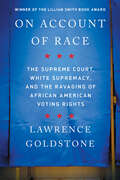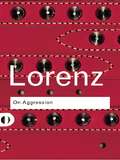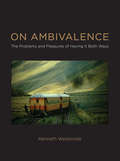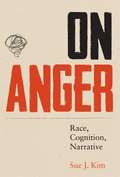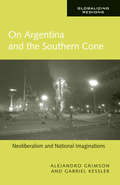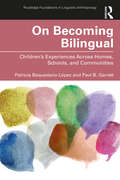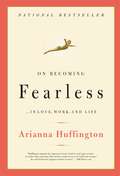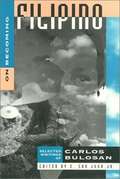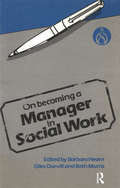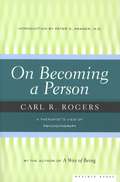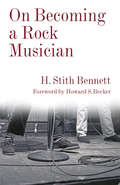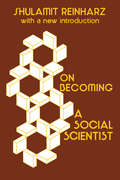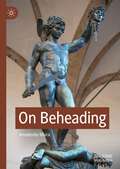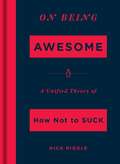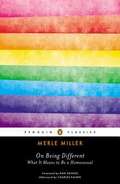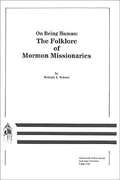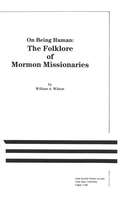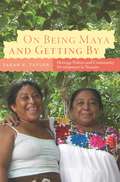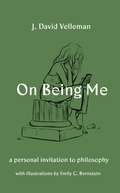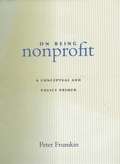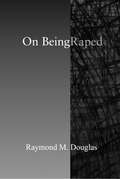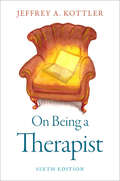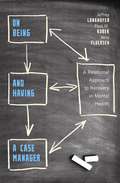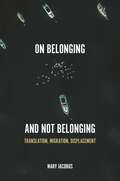- Table View
- List View
On Account of Race: The Supreme Court, White Supremacy, and the Ravaging of African American Voting Rights
by Lawrence GoldstoneAn award–winning constitutional law historian examines case–based evidence of the court's longstanding support for white supremacy (often under the guise of ""states rights"") to reveal how that bias has allowed the court to solidify its position as arguably the most powerful branch of the federal government.One promise of democracy is the right of every citizen to vote. And yet, from our founding, strong political forces were determined to limit that right. The Supreme Court, Alexander Hamilton wrote, would protect the weak against this very sort of tyranny. Still, as On Account of Race forcefully demonstrates, through the better part of American history the Court has instead been a protector of white rule. And complex threats against the right to vote persist even today.Beginning in 1876, the Supreme Court systematically dismantled both the equal protection guarantees of the Fourteenth Amendment and what seemed to be the right to vote in the Fifteenth. And so a half million African Americans across the South who had risked their lives and property to be allowed to cast ballots were stricken from voting rolls by white supremacists. This vacuum allowed for the rise of Jim Crow. None of this was done in the shadows—those determined to wrest the vote from black Americans could not have been more boastful in either intent or execution.On Account of Race tells the story of an American tragedy, the only occasion in United States history in which a group of citizens who had been granted the right to vote then had it stripped away. It is a warning that the right to vote is fragile and must be carefully guarded and actively preserved lest American democracy perish.
On Aggression (Routledge Classics)
by Konrad LorenzKonrad Lorenz was the author of some of the most popular books ever published about animals, including the best-selling Man Meets Dog and King Solomon's Ring. On Aggression is one of his finest works, as well as the most controversial. Through an insightful and characteristically entertaining survey of animal behaviour, the Nobel Prize winner tracks the evolution of aggression throughout the animal world. He also raises some startling questions when he applies his observations of animal psychology to humankind. His conclusions caused an unprecedented controversy, culminating in a statement adopted by UNESCO in 1989 which appeared to condemn his work. Whether or not Lorenz actually claimed aggression is hard-wired into the human psyche, and that war is an inevitable result, is something readers can decide upon for themselves. However you react, there can be no doubting that in today's violent world this powerful work remains of paramount importance.
On Ambivalence: The Problems and Pleasures of Having it Both Ways
by Kenneth WeisbrodeA concise guide to ambivalence, from Adam and Eve (to eat the apple or not?) to Hamlet (to be or not?) to globalization (e pluribus unum or not?). Why is it so hard to make up our minds? Adam and Eve set the template: Do we or don't we eat the apple? They chose, half-heartedly, and nothing was ever the same again. With this book, Kenneth Weisbrode offers a crisp, literate, and provocative introduction to the age-old struggle with ambivalence. Ambivalence results from a basic desire to have it both ways. This is only natural—although insisting upon it against all reason often results not in "both" but in the disappointing "neither." Ambivalence has insinuated itself into our culture as a kind of obligatory reflex, or default position, before practically every choice we make. It affects not only individuals; organizations, societies, and cultures can also be ambivalent. How often have we asked the scornful question, "Are we the Hamlet of nations"? How often have we demanded that our leaders appear decisive, judicious, and stalwart? And how eager have we been to censure them when they hesitate or waver? Weisbrode traces the concept of ambivalence, from the Garden of Eden to Freud and beyond. The Obama era, he says, may be America's own era of ambivalence: neither red nor blue but a multicolored kaleidoscope. Ambivalence, he argues, need not be destructive. We must learn to distinguish it from its symptoms—selfishness, ambiguity, and indecision—and accept that frustration, guilt, and paralysis felt by individuals need not lead automatically to a collective pathology. Drawing upon examples from philosophy, history, literature, and the social sciences, On Ambivalence is a pocket-sized portrait of a complex human condition. It should be read by anyone who has ever grappled with making the right choice.
On Anger: Race, Cognition, Narrative
by Sue J. KimAnger is an emotion that affects everyone regardless of culture, class, race, or gender-but at the same time, being angry always results from the circumstances in which people find themselves. In On Anger, Sue J. Kim opens a stimulating dialogue between cognitive studies and cultural studies to argue that anger is always socially and historically constructed and complexly ideological, and that the predominant individualistic conceptions of anger are insufficient to explain its collective, structural, and historical nature. On Anger examines the dynamics of racial anger in global late capitalism, bringing into conversation work on political anger in ethnic, postcolonial, and cultural studies with recent studies on emotion in cognitive studies. Kim uses a variety of literary and media texts to show how narratives serve as a means of reflecting on experiences of anger and also how we think about anger-its triggers, its deeper causes, its wrongness or rightness. The narratives she studies include the film Crash, Maxine Hong Kingston's The Woman Warrior, Tsitsi Dangarembga's Nervous Conditions and The Book of Not, Ngugi wa Thiong'o's Devil on the Cross and Wizard of the Crow, and the HBO series The Wire. Kim concludes by distinguishing frustration and outrage from anger through a consideration of Stéphane Hessel's call to arms, Indignez-vous! One of the few works that focuses on both anger and race, On Anger demonstrates that race-including whiteness-is central to our conceptions and experiences of anger.
On Argentina and the Southern Cone: Neoliberalism and National Imaginations (Global Realities #Vol. 3)
by Alejandro Grimson Gabriel KesslerThis book considers how globalization is impacting contemporary Argentina-via regional trading blocs, through migrations across its borders, and through the emerging transnational border regions that it shares with other Latin American nations. Overshadowing all of these trends is the current crisis brought on by both international financial institutions possessing an increasing say over how the country is run and internal elites trying to use Argentina's integration into the world financial system to their own advantage. Argentina has long imagined itself as a European nation, qualitatively different from its Latin American neighbors. But recent events are forcing it to change its perception of itself. As the size of Argentina's transnational community continues to swell, and as the nation continues its financial and social implosion, Argentinians are being forced to re-imagine the nation as being Latin American, replete with the histories and problems of that part of the world.
On Becoming Bilingual: Children’s Experiences Across Homes, Schools, and Communities
by Paul B. Garrett Patricia Baquedano-LópezOn Becoming Bilingual: Children’s Experiences across Homes, Schools, and Communities provides a theoretical and methodological introduction to research on children’s participation in and across a multiplicity of activities where they display complex linguistic and sociocultural knowledge. From a perspective that engages intersections of language, race, and class, the book reviews foundational and recent studies highlighting innovations, trends, and future directions for research. The book offers a helpful set of resources, including guiding questions at the start of each chapter, links to online and bibliographic sources, discussion questions and activities, and a glossary of key terms. This book is intended for scholars and students in language-oriented fields of study who are interested in learning about how bilingual children engage with, negotiate, and transform their social worlds.
On Becoming Fearless ... in Love, Work, and Life: In Love, Work, And Life
by Arianna HuffingtonObserving that her own teenage daughters were beginning to experience some of the same fears that had once burdened her--how attractive am I? do people like me? do I dare speak up?--Arianna Huffington began to examine the ways in which fear affects all our lives. In stories drawn from her own experiences and from the lives of other women, she points toward the moments of extraordinary strength, courage, and resilience that result from confronting and overcoming fear. And she outlines the steps anyone can take to conquer fear. Her book shows us how to become bold from the inside out--from feeling comfortable in our own skin to getting what we want in love and at work to changing the world.
On Becoming Filipino: Selected Writings Of Carlos Bulosan
by E. San JuanA collection of Carlos Bulosan's short stories, essays, poetry, and correspondence.
On Becoming a Manager in Social Work
by Barbara Hearn Giles DarvillToo often professional staff are thrust into the role of manager without preparation or subsequent guidance over what becoming a manager entails. On Becoming a Manager is written by managers from a range of personal social services settings. It describes the transition from practice into this new world of management and includes advice, guidance and tips on a range of issues, including managing risk, change, conflict and resources. Alongside these are tools for managers which are particularly relevant in the context of Community Care and the Children Act 1989, such as budgeting, evaluating and empowerment through contracts. It is an essential reader for about to be , new and existing managers wishing to improve and consolidate their practice.
On Becoming a Person: A Therapist's View of Psychotherapy (Pyschology/self-help Ser.)
by Carl RogersThe late Carl Rogers, founder of the humanistic psychology movement, revolutionized psychotherapy with his concept of "client-centered therapy." His influence has spanned decades, but that influence has become so much a part of mainstream psychology that the ingenious nature of his work has almost been forgotten. A new introduction by Peter Kramer sheds light on the significance of Dr. Rogers's work today. New discoveries in the field of psychopharmacology, especially that of the antidepressant Prozac, have spawned a quick-fix drug revolution that has obscured the psychotherapeutic relationship. As the pendulum slowly swings back toward an appreciation of the therapeutic encounter, Dr. Rogers's "client-centered therapy" becomes particularly timely and important.
On Becoming a Rock Musician (Legacy Editions)
by H. Stith BennettIn the 1960s and 1970s, becoming a rock musician was fundamentally different than playing other kinds of music. It was a learned rather than a taught skill. In On Becoming a Rock Musician, sociologist H. Stith Bennett observes what makes someone a rock musician and what persuades others to take him seriously in this role. The book explores how bands form; the backstage and onstage reality of playing in a band; how bands promote themselves and interact with audiences and music professionals like DJs; and the role of performance.
On Becoming a Social Scientist: From Survey Research and Participant Observation to Experimental Analysis
by Shulamit ReinharzThis autobiographical analysis of the many difficult issues, dilemmas, choices, and adjustments involved in becoming a social scientist highlights the strengths and limitations of two principal research methods: survey research and participant observation. It emphasizes how these research methods are actually experienced, in contrast to how they are ideally described in texts.
On Beheading
by Amalendu MisraBeheading is not an uncommon undertaking. As a particularized physical violence, it has been practiced by all societies and civilizations at some point in their history. In fact, for millennia public beheadings around the world were routine. In contemporary international society some states and many non-state actors regularly engage in this undertaking.This begs the obvious question: why put a human being through this unimaginable cruelty? While the idea of execution by decapitation appears visceral and horrific, it has always been grounded in cultural, religious and political contexts. If contemporary history is any proof, the enterprise of beheading a fellow human being appears to be making a comeback in certain religious and political landscapes.A question of enormous intellectual importance, the phenomenon of beheading is understudied. There have been many explanations surrounding specific forms of beheading through the ages. However, no inclusive study has engaged with it in its entirety.Primarily a philosophical reflection, On Beheading is inter-disciplinary in nature; it freely cuts across various disciplines within the broad framework of the social sciences. It uses a vast array of empirical evidence from anthropology, literature, jurisprudence and religion to build a discourse and narrative that brings this subject under one intellectual umbrella.
On Being Awesome: A Unified Theory of How Not to Suck
by Nick RiggleIn this lively treatise, pro-skater-turned-philosopher Nick Riggle presents a theory of awesomeness (and its opposite, suckiness) that’s both sharply illuminating and more timely than ever “Nick Riggle’s fun book is ‘awesome’ by its own definition. But don’t miss its profound ambition, which is to show how philosophy unearths the structure of ordinary language, defines the meaning of life in routine business, and poses the question of how best to live.” —Aaron James, author of Assholes: A Theory We all know people who are awesome and people who suck, but what do we really mean by these terms? Have you ever been chill or game? Do you rock or rule? If so, then you’re tapped into the ethics of awesomeness. Awesome people excel at creating social openings that encourage expressions of individuality and create community. And if you’re a cheapskate, self-promoter, killjoy, or douchebag, you’re the type of person who shuts social openings down. Put more simply: You suck. From street art to folk singers, Proust to the great etiquette writer Emily Post, President Obama to former Los Angeles Dodger Glenn Burke, Riggle draws on pop culture, politics, history, and sports to explore the origins of awesome, and delves into the nuances of what it means to suck and why it’s so important to strive for awesomeness. An accessible and entertaining lens for navigating the ethics of our time, On Being Awesome provides a new and inspiring framework for understanding ourselves and creating meaningful connections in our everyday lives.
On Being Different: What It Means to Be a Homosexual
by Merle MillerOriginally published in 1971, Merle Miller's On Being Different is a pioneering and thought-provoking book about being homosexual in the United States. <P> Just two years after the Stonewall riots, Miller wrote a poignant essay for the New York Times Magazine entitled "What It Means To Be a Homosexual" in response to a homophobic article published in Harper's Magazine. Described as "the most widely read and discussed essay of the decade," the article was developed into the remarkable short book On Being Different - one of the earliest memoirs to affirm the importance of coming out.
On Being Here to Stay
by Michael AschWhat, other than numbers and power, justifies Canada's assertion of sovereignty and jurisdiction over the country's vast territory? Why should Canada's original inhabitants have to ask for rights to what was their land when non-Aboriginal people first arrived? The question lurks behind every court judgment on Indigenous rights, every demand that treaty obligations be fulfilled, and every land-claims negotiation.Addressing these questions has occupied anthropologist Michael Asch for nearly thirty years. In On Being Here to Stay, Asch retells the story of Canada with a focus on the relationship between First Nations and settlers.Asch proposes a way forward based on respecting the "spirit and intent" of treaties negotiated at the time of Confederation, through which, he argues, First Nations and settlers can establish an ethical way for both communities to be here to stay.
On Being Human
by William WilsonA collection of narratives, humorous stories, and songs from Mormon missionaries that has become a classic study of narrative folklore. The 64th annual Faculty Honor Lecture, in the Humanities, Utah State University.
On Being Human: Folklore of Mormon Missionaries
by William WilsonA collection of narratives, humorous stories, and songs from Mormon missionaries that has become a classic study of narrative folklore. The 64th annual Faculty Honor Lecture, in the Humanities, Utah State University.
On Being Maya and Getting By: Heritage Politics and Community Development in Yucatán (IMS Culture and Society)
by Sarah R. TaylorOn Being Maya and Getting By is an ethnographic study of the two Ek’Balams—a notable archaeological site and adjacent village—of the Yucatán Peninsula. When the archaeological site became a tourist destination, the village became the location of a community-based tourism development project funded by the Mexican government. Overt displays of heritage and a connection to Maya antiquity became important and profitable for the modern Maya villagers. Residents of Ek’Balam are now living in a complex ecosystem of natural and cultural resources where the notion and act of “being Maya” is deeply intertwined with economic development. The book explores how Ek’Balam villagers negotiate and maneuver through a web of social programs, tourists, volunteers, and expectations while living their daily lives. Focusing on the active processes in which residents choose to participate, author Sarah R. Taylor provides insights into how the ideological conflicts surrounding economic development play out in the negotiations between internal community politics and external social actors. The conflicts implicit to conceptions of “community” as a target for development are made explicit through the systematic questioning of what exactly it means to be a member of a local, indigenous, or sustainable community in the process of being developed. On Being Maya and Getting By is a rich description of how one community is actively negotiating with tourism and development and also a call for a more complex analysis of how rural villages are connected to greater urban, national, and global forces.
On Being Me: A Personal Invitation to Philosophy
by J. David VellemanA moral philosopher’s meditations on some of life’s most important questionsWe’ve all had to puzzle over such profound matters as birth, death, regret, free will, agency, and love. How might philosophy help us think through these vital concerns? In On Being Me, renowned moral philosopher J. David Velleman presents a concise, accessible, and intimate exploration into subjects that we care deeply about, offering compelling insights into what it means to be human.Each of Velleman’s short, personal chapters begins with a theme: “Being Glad I Was Born,” “Wanting to Go On,” “Fearing the End,” “Regretting What Might Have Been,” “Aspiring to Authorship,” “Making Things Happen,” and “Wanting to Be Loved.” Reflecting on how daily life presents us with thorny riddles that need working out, Velleman arrives at unexpected conclusions about survival and personal identity, the self and its future, time and morality, the rationality of regret, free will and personal efficacy, and goodness and love. He shows that we can rely on our own powers of thought to arrive at a better understanding of the most fundamental parts of ourselves—and that the methods of philosophy can help get us there.Beautifully illustrated by New Yorker contributing artist Emily Bernstein, On Being Me invites us to approach life philosophically.
On Being Nonprofit: A Conceptual and Policy Primer
by Peter FrumkinThis concise and illuminating book provides a road map to the evolving conceptual and policy terrain of the nonprofit sector. Drawing on prominent economic, political, and sociological explanations of nonprofit activity, Peter Frumkin focuses on four important functions that have come to define nonprofit organizations. The author clarifies the debate over the underlying rationale for the nonprofit and voluntary sector's privileged position in America by examining how nonprofits deliver needed services, promote civic engagement, express values and faith, and channel entrepreneurial impulses. He also exposes the difficult policy questions that have emerged as the boundaries between the nonprofit, business, and government sectors have blurred. Focusing on nonprofits' growing dependence on public funding, tendency toward political polarization, often idiosyncratic missions, and increasing commercialism, Peter Frumkin argues that the long-term challenges facing nonprofit organizations will only be solved when they achieve greater balance among their four central functions. By probing foundational thinking as well as emergent ideas, the book is an essential guide for nonprofit novitiates and experts alike who want to understand the issues propelling public debate about the future of their sector. By virtue of its breadth and insight, Frumkin's book will be an invaluable resource for anyone interested in understanding the complex interplay of public purposes and private values that animate nonprofit organizations.
On Being Raped
by Raymond M. DouglasA personal and moral inquiry into the crime we do our best to ignore: the rape of adult men When Raymond M. Douglas was an eighteen-year-old living in Europe, he was brutally raped by a Catholic priest. He eventually moved to the United States and became a highly regarded historian, writing with great care about the violent expulsion of Germans from Eastern Europe after the Second World War, and parsing the complicated moral questions of these actions. But until now, Douglas has been silent about his own experience of trauma. In On Being Raped, Douglas recounts this painful event and his later attempts to seek help to lay bare the physical and psychological trauma of a crime we still don't openly discuss: the rape of adult men by men. With eloquence and passion, he examines the requirements society implicitly places upon men who are victims of rape, examines the reasons for our resounding silence around this issue, and reveals how alarmingly prevalent this kind of sexual violence truly is. An insightful and sensitive analysis of a type of bodily violation that we either joke about or ignore, On Being Raped promises to open an important dialogue about male rape and what needs to be done to provide adequate services and support for victims. "But before that can happen," writes Douglas, "men who have been raped will have to come out of the shadows. . . A start has to be made somewhere. This is my attempt at one. "
On Being a Therapist
by Jeffrey A. KottlerFor more than thirty years, On Being a Therapist has inspired generations of mental health professionals (and their clients) to explore the most private, confusing, and sacred aspects of helping others. In this thoroughly revised and updated sixth edition, Jeffrey Kottler explores many of the challenges that therapists face in their practices today, including pressures from increased technology, economic realities, and advances in theory and technique. He also examines the stress factors that are brought on from managed care bureaucracy, conflicts at work, and clients' own anxiety and depression. This new edition includes updated sources, new material on technology, new challenges that therapists face as a result of the global pandemic, and an emphasis on teletherapy and navigating ethics and practice logistics remotely. Generations of students and practitioners in counseling, psychology, social work, psychotherapy, marriage and family therapy, and human services have found comfort, support, and renewed confidence in On Being a Therapist, and this sixth edition builds upon this solid foundation as it continues to educate, inform, and inspire helping professionals everywhere.
On Being and Having a Case Manager: A Relational Approach to Recovery in Mental Health
by Jerry Floersch Jeffrey Longhofer Paul KubekOn Being and Having a Case Manager stresses the importance of the process of building relationships in helping clients realize independent lives. Based on a two-year study of Marilyn and her case managers, this book emphasizes the intentional exchange of attention and information between case managers, clients, and others within the caring network and clearly outlines a practical method for all service providers, clients, family members, and close friends to follow.Throughout the day, from moment to moment, relationships fluctuate among doing for, doing with, standing by for support, and doing for oneself. By observing Marilyn and her case manager, the authors prove the value of mutually and continuously monitoring these fluctuations within three primary domains-feeling, thinking, and acting-while carrying out daily activities. These findings show that managers are often stuck in doing-for modes of relating. Indeed, this may be one of the factors that contribute most to case manager and client burnout. While some clients with severe and persistent symptoms may, in fact, frequently require others to do-for, some like Marilyn may not require as much. They may need more doing-with and standing-by to encourage mastery and the internalization of confidence.
On Belonging and Not Belonging: Translation, Migration, Displacement
by Mary JacobusA look at how ideas of translation, migration, and displacement are embedded in the works of prominent artists, from Ovid to Tacita DeanOn Belonging and Not Belonging provides a sophisticated exploration of how themes of translation, migration, and displacement shape an astonishing range of artistic works. From the possibilities and limitations of translation addressed by Jhumpa Lahiri and David Malouf to the effects of shifting borders in the writings of Eugenio Montale, W. G. Sebald, Colm Tóibín, and many others, esteemed literary critic Mary Jacobus looks at the ways novelists, poets, photographers, and filmmakers revise narratives of language, identity, and exile. Jacobus’s attentive readings of texts and images seek to answer the question: What does it mean to identify as—or with—an outsider?Walls and border-crossings, nomadic wanderings and Alpine walking, the urge to travel and the yearning for home—Jacobus braids together such threads in disparate times and geographies. She plumbs the experiences of Ovid in exile, Frankenstein’s outcast Being, Elizabeth Bishop in Nova Scotia and Brazil, Walter Benjamin’s Berlin childhood, and Sophocles’s Antigone in the wilderness. Throughout, Jacobus trains her eye on issues of transformation and translocation; the traumas of partings, journeys, and returns; and confrontations with memory and the past.Focusing on human conditions both modern and timeless, On Belonging and Not Belonging offers a unique consideration of inclusion and exclusion in our world.
